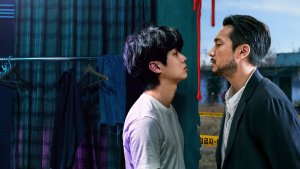 Cat-Loving Haruki Murakami and the Abundance of Movie Adaptations
Cat-Loving Haruki Murakami and the Abundance of Movie Adaptations
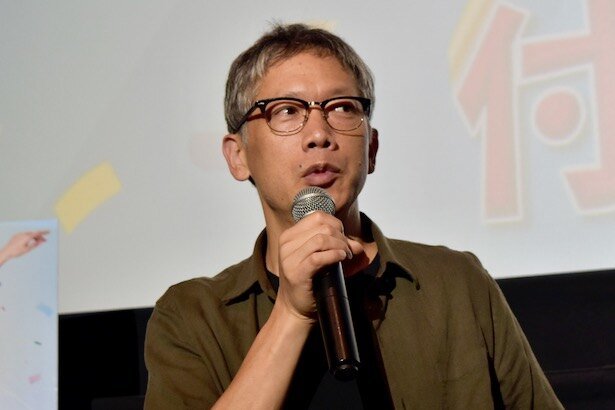 Disclaimer: Attention, the following article may contain spoilers. All individuals mentioned in this text are referred to in the standard Japanese format (surname + name). Short segments which Yaguchi contributed to multi-directorial projects are not discussed because of their unavailability. This article can be viewed in dark mode.
Disclaimer: Attention, the following article may contain spoilers. All individuals mentioned in this text are referred to in the standard Japanese format (surname + name). Short segments which Yaguchi contributed to multi-directorial projects are not discussed because of their unavailability. This article can be viewed in dark mode.
If you enjoy light-hearted Japanese comedies, then you must have heard about Yaguchi Shinobu. At first glance, Yaguchi resembles more of an academician rather than someone having a career in visual arts, due to his rectangle glasses and a blazer coat. However, we could say that this particular filmmaker is, indeed, a professor who crafts inspirational zero-to-hero stories. It is our great pleasure to present to the MDL community none other than Yaguchi Shinobu himself.
Yaguchi Shinobu was born on the 30th of May, 1967, and he decided to pursue a career in filmmaking already at the age of 8 upon seeing Steven Spielberg's classic monster film Jaws (1975). "When I saw that film, I felt another reality that was created beyond the reality of the movie theater I was sitting in, and that was an impression that I never forgot," he stated in a 2017 interview (source).
Interestingly, Yaguchi never had aspirations to become a filmmaker revered by international critics. One can notice even a sort of disdain from Yaguchi's part towards the giants of Japanese Cinema: "Please forget about those old fogies called Kurosawa, Itami and Ozu. Really, we've got lots of good independent young directors coming out of Japan" (source). Indeed, having directed 11 motion pictures over the course of nearly 30 years, Yaguchi Shinobu appears to be an expert at providing light entertainment devoid of larger-than-life messages. Allegedly, he took a liking to the comedy genre because it allows him to explore in greater depth people who are on the margins of society (source). In addition, the director frequently collaborates with the respected production company Altamira Pictures (which churned out such hits as Shall We Dance? and I Just Didn't Do It) as well as with his wife, Yaguchi Junko, who co-writes screenplays.
Now, let's take a look at individual movies directed by Yaguchi Shinobu:
The Rain Women (1990) |
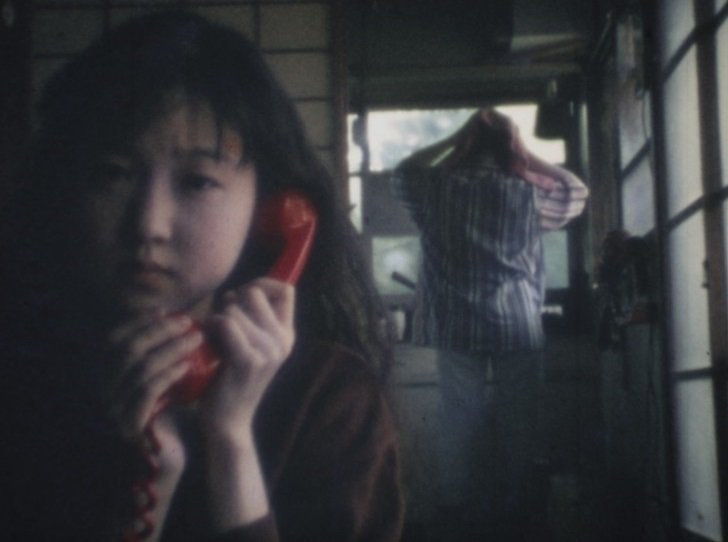
Yaguchi Shinobu's debut feature is a rainy tale about two girls (Komaba Kayoko, Makii Miwa) killing time in their Tokyo apartment. One could think that Yaguchi does a standard slice-of-life flick as if rehashing the great Yasujiro Ozu; but in fact, The Rain Women is an abstract comedy filled with J-Pop sequences, stealing cabbage, and synchronised tooth brushing. Harvard Film Archive hailed the film as "a bewitchingly melancholic atmosphere of unpredictability" (source). This, albeit old and hard to find, motion picture clearly shows that young Yaguchi Shinobu had greater ambitions than the master of abstract himself, Charlie Kaufman. The Rain Women movie is sometimes shown at various film festivals, serving as a remnant of Yaguchi's early beginnings as a filmmaker.
Down the Drain (1993) |
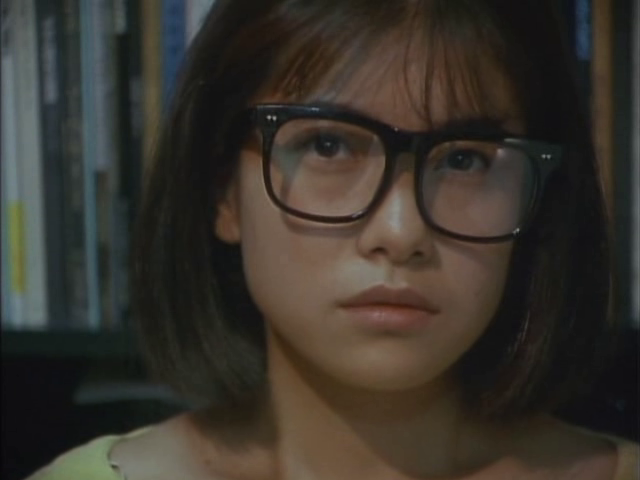
The year 1993 saw the release of Yaguchi's Down the Drain. This time the director played with the genre of black comedy, but the movie can very well function as a psychological thriller. The main heroine of the picture is Suzuki Junko (Serikawa Saori) who is a slightly absent-minded schoolgirl with visual impairment. When one day she is caught by a train conductor for having a friend's travel pass, a series of grave misfortunes is set into motion. Due to the accidents which Junko unwittingly causes, she goes missing for 33 days, worrying her family and turning friends against her in the process.
Even though the film does not contain any explicit gore or violence, we found it to be as unnerving as Kurosawa Kiyoshi's Cure (1997). Talk about the bad luck of the main heroine... It's almost as if Stephen King himself wrote the screenplay! All in all, just as with every other of his movies, Yaguchi communicates with Down the Drain that one always has to find his or her role in life.
My Secret Cache (1997) |
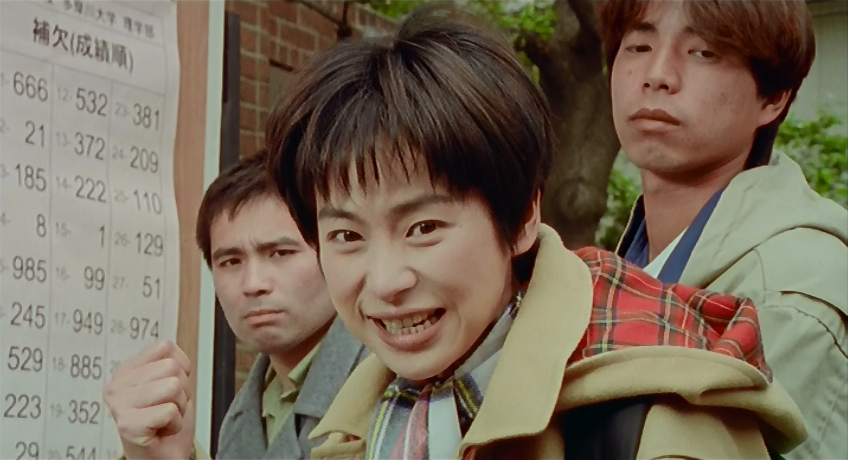
Four years after Down the Drain, Yaguchi released My Secret Cache (1997) with then up-and-coming actress Nishida Naomi in the leading role. In this insane comedy, we follow the misadventures of Suzuki Sakiko. Ever since childhood, Sakiko had only one, true passion: money. She never really had friends or boyfriends, but money was always there to cheer her up. Unsurprisingly, Sakiko got the job as a bank clerk, but she quickly realized that counting other people's money is not that exciting. All of a sudden, she became a hostage during a bank robbery. Having barely survived the ordeal (in the course of which the robbers died), Sakiko remembers while recovering in a hospital that a suitcase filled with millions of yen lies at the bottom of a watery pit, in the middle of Aokigahara forest... Sakiko is going to do whatever it takes to retrieve the money from the difficult terrain, even if it means becoming a master at geology, swimming, diving, and mountain climbing!
What makes this brilliant comedy work are the following aspects: Hilarious screenplay by Yaguchi Shinobu and outstanding performance of Nishida Naomi as quirky and spaced-out Sakiko. Her character totally rocks! This film does not only provide entertainment, but it also serves as a much-needed dosage of motivation for those who procrastinate. Find the drive that keeps you going, and you will reach the top, just like Sakiko! If Yaguchi would ever want to make a sequel to one of his previous projects, then he should definitely do My Secret Cache 2.
Adrenaline Drive (1999) |
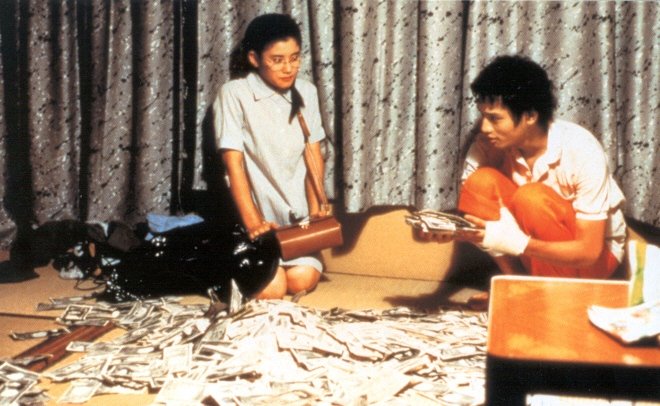 Yaguchi Shinobu continued the theme of money obsession in his next motion picture, Adrenaline Drive from 1999. Suzuki Satoru (Ando Masanobu) is an introverted driver abused by his employer at a car-rental company. Sato Shizuko (Ishida Hikari) is a workaholic nurse with no social life. The two innocent strangers become partners in crime as they accidentally get their hands on the yakuza's dirty money. Being on the run from the gangsters, Satoru and Shizuko get themselves entangled in a series of slapstick situations, in which they constantly try to outsmart the bad guys.
Yaguchi Shinobu continued the theme of money obsession in his next motion picture, Adrenaline Drive from 1999. Suzuki Satoru (Ando Masanobu) is an introverted driver abused by his employer at a car-rental company. Sato Shizuko (Ishida Hikari) is a workaholic nurse with no social life. The two innocent strangers become partners in crime as they accidentally get their hands on the yakuza's dirty money. Being on the run from the gangsters, Satoru and Shizuko get themselves entangled in a series of slapstick situations, in which they constantly try to outsmart the bad guys.
The synopsis of the film sounds very generic, but it is best to treat Adrenaline Drive as a conscious parody of action/romance flicks. Just as the viewers think that something conventional or cliched is going to happen, Yaguchi surprises us with a plot twist. Evidently, Ishida Hikari, as well as Ando Masanobu, are the heart of the film, and the story would not have worked if it had not been for their marvelous chemistry. The hilarious supporting parts done by Matsushige Yutaka and the late Tsunogae Kazue cannot go unnoticed as well.
Waterboys (2001) |
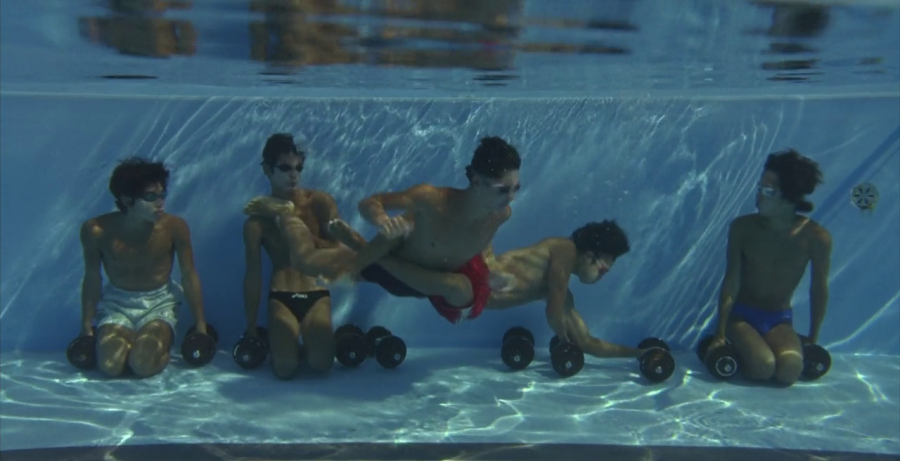
Synchronized swimming is a fun, mesmerizing sports activity, yet we hardly see this competition, unless it is featured during the Olympic games. Unfortunately, it is still regarded as a "women's sports" in many parts of the world. Waterboys is based on the true story of the boys' synchro team, and has, arguably, the quirkiest characters in all of Yagichi's films. The Swimming Club of Tadano Boys High School is about to disband as no new students are joining in and the last remaining member is a wimpy kid, Suzuki Satoshi (Tsumabuki Satoshi). The club, however, experiences resurgence in popularity when a beautiful, young female teacher (Manabe Kaori) joins the high school to supervise the swimming activities. When the teacher tries to convert the group to a synchronized swimming team, the majority of the students bail out. Only five, good-for-nothing misfits stay in the club, but even they are left on their own as the teacher suddenly takes maternity leave. The regional school festival is inevitably approaching, so the friends ask a certain dolphin trainer (Takenaka Naoto) to help them out...
From this point on, the wacky adventures of Waterboys begin! These adolescent boys accomplish their odd, Herculean-like task through their power of friendship and determination. Of course, they also want to impress fellow high school girls. With Waterboys, you will get to see a lot of absurd, manga-esque comedy (yet without over-the-top sequences). Yaguchi naturally presents the teenager environment and even briefly touches upon the "Okama" motif.
The director stated in an interview that Waterboys is the go-to film which he recommends to newcomers wanting to check out his movies. Indeed, this particular production was not only a box-office hit, but it also jettisoned Tsumabuki Satoshi, Tamaki Hiroshi, Hirayama Aya into stardom. Waterboys even inspired a two-season drama; however, it was made without Yaguchi's involvement: "If you like, we can consider Waterboys as my child. The spin-offs are more like my grandchildren, and I don’t feel I should be involved in saying anything about them. I guess I am ambivalent" (source).
Swing Girls (2004) |
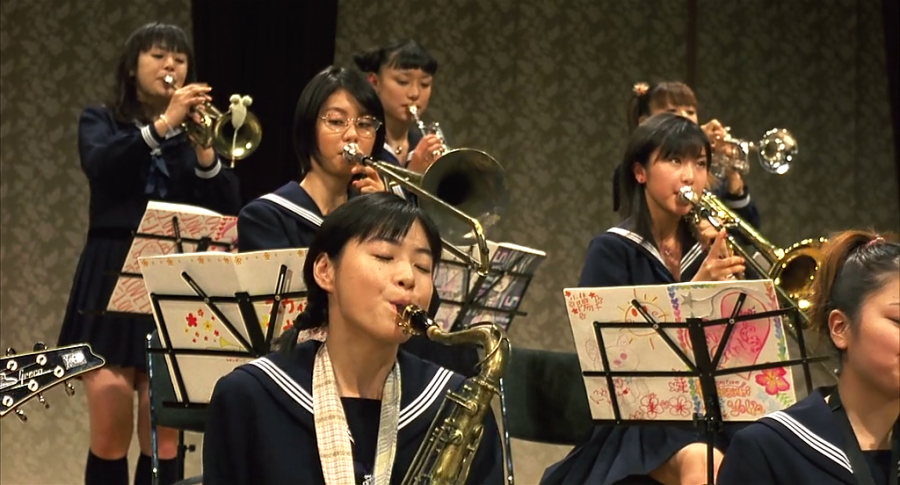
This time inspired by the real Tateshina High School Jazz Club, Yaguchi set out to make a spiritual companion piece to Waterboys. Consequently, Swing Girls also focuses on a group of youngsters who engage in an unlikely activity: Instead of enjoying summer vacation, a group of inept girls is dying of boredom during their cram courses. Tomoko (Ueno Juri) and her friends persuade the math teacher, Mr Ozawa (Takenaka Naoto), to let them deliver bento boxes for the brass band. However, the girls accidentally spoil the food en route, and the band suffers from poisoning. Takuo (Hiraoka Yuta), the only brass band member who did not eat lunch, forces Tomoko and the other girls into joining the band as substitutes. Due to their number, he turns the girls into a big band performing jazz. Consequently, they become “Swing Girls and a Boy”.
Swing Girls went on to be an even greater success than Waterboys, inspiring junior and high school students of the early 2000s to try out jazz music. Interestingly, rather than seeking out experienced musicians, the director went with the traditional casting process and, later, put the actresses through the exhausting process of learning how to play instruments. Just take a look at Ueno Juri trying to hit that groove! The movie certainly proved to be a challenging endeavor because each girl had to know her specific place in the band. What is more, they had to actually play like professional musicians on a stage. Considering the final effect, Swing Girls without a doubt can be called a classic comedy with catchy jazz beats. It’s difficult to imagine that this is Ueno Juri's first motion picture she ever did, and what a breakthrough it was for her!
Swing Girls became such a huge hit in Japan that the movie spawned a few media events, including the so-called Swing Girls: First and Last Concert (2005). Unfortunately, the girls never formed an official band, but they sure stirred the domestic market in the early 2000s. Interestingly, the movie’s official site is still operational, 16 years after the film’s release.
Happy Flight (2008) |
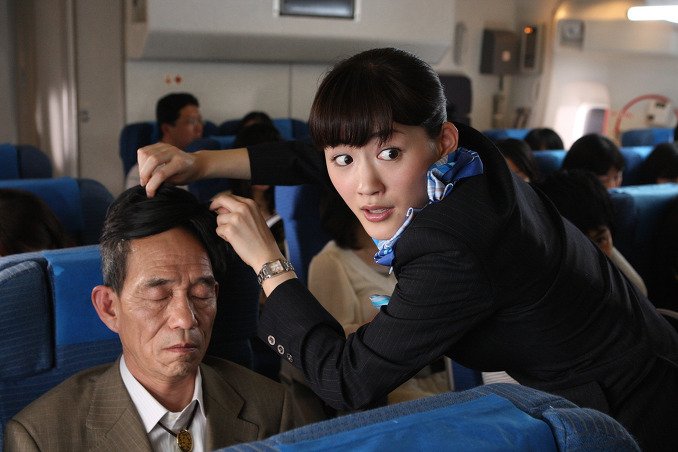 In his 2008 production, Yaguchi Shinobu chose to focus on the theme of flying. Initially, he thought about doing a thriller film. However, after two years of research, Yaguchi abandoned this idea, learning that the possibility of an aircraft actually crashing was extremely low. At the same time, the director discovered the fun and responsibilities of people working behind the aviation industry, which made him focus on these aspects. As a result, Happy Flight can be best described as a mixture of comedy and disaster flick, borrowing familiar concepts from the Wings sitcom and Airport 1970 movie. The story presents us with a day in the life of workers at Haneda Airport. The viewers experience the hustle and bustle of air transportation as told through the hardships of pilots, flight attendants, mechanics, the ground-crew, dispatchers, traffic controllers, and even the bird patrol.
In his 2008 production, Yaguchi Shinobu chose to focus on the theme of flying. Initially, he thought about doing a thriller film. However, after two years of research, Yaguchi abandoned this idea, learning that the possibility of an aircraft actually crashing was extremely low. At the same time, the director discovered the fun and responsibilities of people working behind the aviation industry, which made him focus on these aspects. As a result, Happy Flight can be best described as a mixture of comedy and disaster flick, borrowing familiar concepts from the Wings sitcom and Airport 1970 movie. The story presents us with a day in the life of workers at Haneda Airport. The viewers experience the hustle and bustle of air transportation as told through the hardships of pilots, flight attendants, mechanics, the ground-crew, dispatchers, traffic controllers, and even the bird patrol.
It may initially seem that Happy Flight is just an educational video intended to promote All Nippon Airways, but the film takes (quite literally) a U-turn halfway through when a flight from Tokyo to Honolulu has a major malfunction. As a result, Yaguchi provides us with a thrilling spectacle akin to National Geographic's Air Crash Investigation series. All in all, Happy Flight serves to emphasize that airport staff members constitute a complex system of integrated teams, the purpose of which is to ensure the safety of all passengers. Needless to say, the movie is ridiculously enjoyable, mainly due to the performances of Ayase Haruka, Tanabe Seiichi, Tokito Saburo, Tabata Tomoko, Hiraiwa Kami, and Kishibe Ittoku.
ROBO-G (2012) |
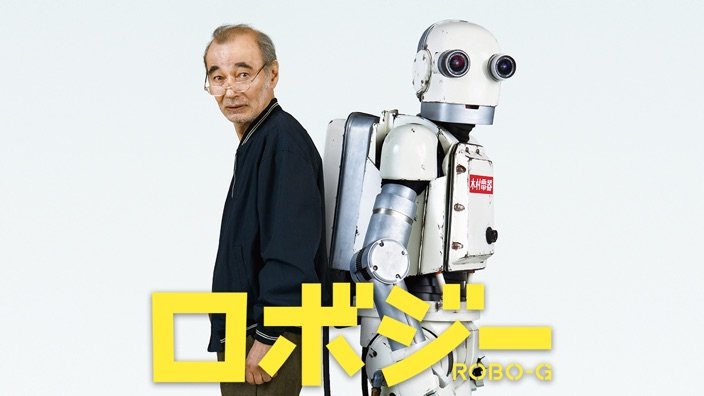 A stubborn, grumpy old man, Suzuki Shigemitsu, (Mickey Curtis) who does not get along with his family; an inquisitive and energetic college student, Yoko (Yoshitaka Yuriko); and three nerdy engineers who make household appliances, are all it takes to make a robot or at least a robot mystification. Under normal circumstances, it would be improbable for these characters to encounter each other. However, due to a concurrence of unusual events, Mr Suzuki "becomes" a robot in order to save the engineering project from failure and embarrassment. The old man in a robot suit accidentally captures the attention of the college girl, which puts the three engineers in a Catch-22 situation. Many viewers would think that movies about false impersonation and identity theft reach the climax when the secret is discovered, but this is not the case in this picture. Yaguchi makes us wonder how the secret will be discovered while gently highlighting the problem of the ageing population in Japan.
A stubborn, grumpy old man, Suzuki Shigemitsu, (Mickey Curtis) who does not get along with his family; an inquisitive and energetic college student, Yoko (Yoshitaka Yuriko); and three nerdy engineers who make household appliances, are all it takes to make a robot or at least a robot mystification. Under normal circumstances, it would be improbable for these characters to encounter each other. However, due to a concurrence of unusual events, Mr Suzuki "becomes" a robot in order to save the engineering project from failure and embarrassment. The old man in a robot suit accidentally captures the attention of the college girl, which puts the three engineers in a Catch-22 situation. Many viewers would think that movies about false impersonation and identity theft reach the climax when the secret is discovered, but this is not the case in this picture. Yaguchi makes us wonder how the secret will be discovered while gently highlighting the problem of the ageing population in Japan.
The situation of the main protagonist, a retired actor trying to relive his glory days, greatly resembles that of Charlie Chaplin's character in Limelight (1952). Similarly to the great Calvero, Mr Suzuki proves that "all the world's a stage" while participating in conventions, showing up on TV, and taking photos with children. The movie ROBO-G may not fulfil the standard Yaguchi's "zero-to-hero" formula simply because the robot is perceived by the masses as the hero; however, it is Mr Suzuki who regains faith in himself towards the end of the film. By playing his "greatest role" ever, Suzuki underlines the fact that it is never too late to introduce new changes in life.
Wood Job! (2014) |
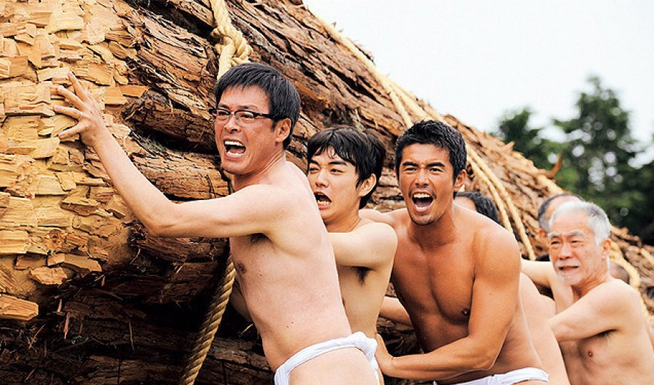 Wood Job! The Easy Life in Kamusari is kind of a special endeavor in Yaguchi's filmography, simply because it is not his original creation, but an adaptation of Miura Shion's novel. The author is one of the big names in contemporary Japanese literature, and her books are often adapted to successful movies and television dramas. There are several movies and dramas set in rural Japan which feel somewhat indifferent, underwhelming, and a bit draggy; however, this is not the case with Wood Job! The viewers are in for an exciting ride from beginning to the end. Although it is not a faithful adaptation, the combination of writing styles from Miura and Yaguchi complement each other, resulting in a perfect motion picture.
Wood Job! The Easy Life in Kamusari is kind of a special endeavor in Yaguchi's filmography, simply because it is not his original creation, but an adaptation of Miura Shion's novel. The author is one of the big names in contemporary Japanese literature, and her books are often adapted to successful movies and television dramas. There are several movies and dramas set in rural Japan which feel somewhat indifferent, underwhelming, and a bit draggy; however, this is not the case with Wood Job! The viewers are in for an exciting ride from beginning to the end. Although it is not a faithful adaptation, the combination of writing styles from Miura and Yaguchi complement each other, resulting in a perfect motion picture.
The main character, Hirano Yuki (Sometani Shota), is a good-for-nothing loser who has just failed the college entrance exam and got dumped by his girlfriend. In the moment of despair, Hirano finds hope through a photo of a beautiful woman (Nagasawa Masami) featured in the advertisement of a forestry training program. The leaflet tagline says "Come and work with us." In view of the protagonist's other options: 1) attend cram school for one more year, or 2) join the Self-Defense Force; Hirano makes a gamble and signs up to a year-long program. Unsurprisingly, a boy from the city, who wears Nike sneakers and eats at McDonald's, underestimates the harsh reality of living in the woods. Nevertheless, he overcomes the inconveniences because he encounters the beautiful woman from the leaflet, Ishi Naoki. As time goes by in a desolate place, Hirano gradually learns his new craft under the guidance of his supervisor, Ida Yoki (Ito Hideaki), and the village elders (Emoto Akira and Mitsuishi Ken). Thanks to these extraordinary experiences, the protagonist develops respect for lumberjacking as well as love for the forest and the local community.
Wood Job! is so much more than just a simple coming-of-age story which provides you with nostalgia. Yaguchi Shinobu beautifully depicts Shinto practices of coexisting with nature, and the peculiarities of forestry as well as its importance in Japanese society. The director, the crew, and all the actors put the meticulous effort in materializing the journey about "the happiest fool" who finds purpose in life. The shooting actually took place deep in the forestry camps of Mie Prefecture for nearly two months. Sometani Shota had learned how to proficiently handle a chainsaw and climb onto some 20 meters high trees (source). The portrayal of Oyamatsumi ritual (literally, Ritual for the Mountain God), also known as the Onbashira Festival was taken with utmost care and it is just awe-inspiring; so much so that this one scene alone deserves a must-watch recommendation.
All in all, Wood Job! was not only a commercial hit (raking in some 700 million yen at the box office), but the film also helped promote educational courses among the Japanese youth. This movie is definitely a must-see for anyone who loves picturesque settings, romance, comedy and Japanese culture.
Survival Family (2017) |
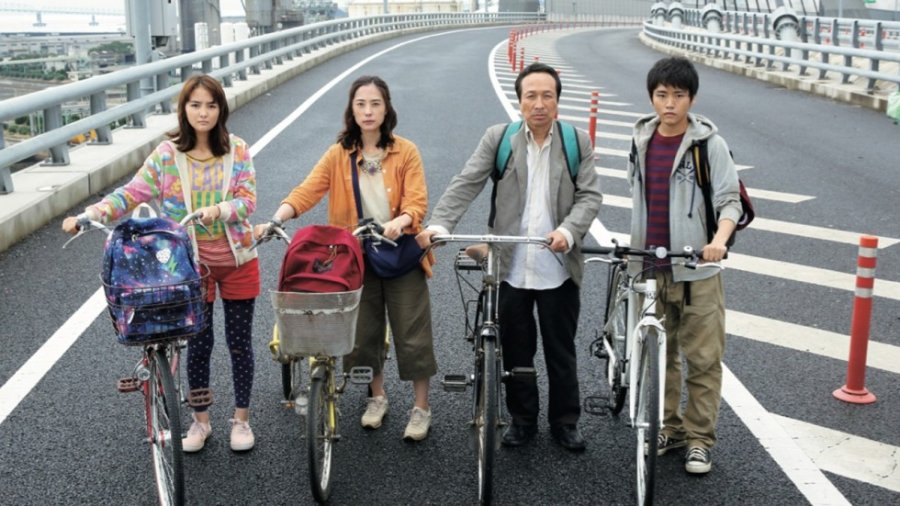 Yaguchi Shinobu's (so far) penultimate film, Survival Family, appears to be a stylistic departure from his previous projects because the director takes an ordinary Japanese family out of the metropolitan safe zone and puts them to trials and tribulations in true Bear Grylls' style.
Yaguchi Shinobu's (so far) penultimate film, Survival Family, appears to be a stylistic departure from his previous projects because the director takes an ordinary Japanese family out of the metropolitan safe zone and puts them to trials and tribulations in true Bear Grylls' style.
Meet the Suzuki family. There is nothing out of the ordinary about them. Head of the family, Yoshiyuki (Kohinata Fumiyo), is an average salaryman in a corporate company. His wife, Mitsue (Fukatsu Eri), does everyday motherly chores. Their children, Kenji (Izumisawa Yuuki) and Yui (Aoi Wakana), are typical modern teenagers, glued to their phones and computers. All of a sudden, a power outage sweeps across Tokyo. Everyone thinks that it is only a temporary inconvenience, but the power does not come back. As days go by, Tokyo becomes a dangerous place to live in due to shortening food and water supplies. Hoping to be able to survive in the countryside, the family sets out on a journey across Japan that will change their lives.
The power outage scenario is the driving vehicle of the story. However, the movie is not a horror-thriller like The Road (2009) but rather a comedy-drama. It tries to stay objective in its examination of a possible apocalypse, but at the same time sways into an optimistic feel, typical of Yaguchi’s flicks, as the Suzukis encounter a variety of positive characters along their way. The director admitted that he was inspired to make the film after the 2011 Tohoku earthquake and tsunami (source). In addition, the movie seems to be especially significant in view of the raging 2020 pandemic.
As a result, Survival Family attempts to get across the message that modern conveniences are just distractions when not used properly. One has to unlearn his or her reliance on technology. This is especially visible in a scene where the Suzukis meet a different family (parents played by Tokito Saburo and Fujiwara Norika) who treat the whole situation as an opportunity for a healthy vacation. Nevertheless, the survival skills are also important, and the family acquires these during their stay on Mr Tanaka’s farm (Daichi Yasuo). It is only when they reach the home of Mitsuo’s father (Emoto Akira) that the family finally learns how to live together and love each other.
Dance with Me (2019) |

Music has always been the central element in most of Yaguchi's works. Interestingly, the director took it to another level by making a musical film, Dance with Me. Yaguchi said that "All the musicals I’ve ever seen are my inspiration for this movie” (source). The heroine, Suzuki Shizuka (Miyoshi Ayaka), is an ordinary office lady and has a strong hatred for music due to her childhood trauma (the name Shizuka literally means quiet.) However, due to an unexpected accident caused by an elderly hypnotist (Takarada Akira), Shizuka's strong aversion to music completely disappears. Consequently, she cannot help herself but sing and dance whenever she hears music cues. Obviously, Shizuka's sudden change of behavior triggers a lot of issues for her at a workplace and while interacting with other people. To cure her condition, Shizuka begins the search for the aforementioned hypnotist. Along the way, she finds helpful friends and learns to embrace her hidden, unconscious ability.
Due to its prevalent music theme, Dance with Me may appear to be yet another live-action blockbuster from the Disney Company. However, the film does not show even a slight deviation from Yaguchi's standard storytelling. The heroine finds her purpose in life, similarly to the characters from Waterboys, Swing Girls, and Wood Job! Nevertheless, we find this particular motion picture a bit of lackluster-ish when compared with other entries from Yaguchi's filmography. Yet, it does not mean that Dance with Me is a mediocre work. The primary advantage this movie gives us is a bijin, Miyoshi Ayaka, who is constantly singing and dancing. In the course of preparation for her role, Miyoshi had undergone two months of intense training (source). You can find some of the music used in the movie, along with the footage, on the Warner Bros. JP's YouTube channel.
Trivia |
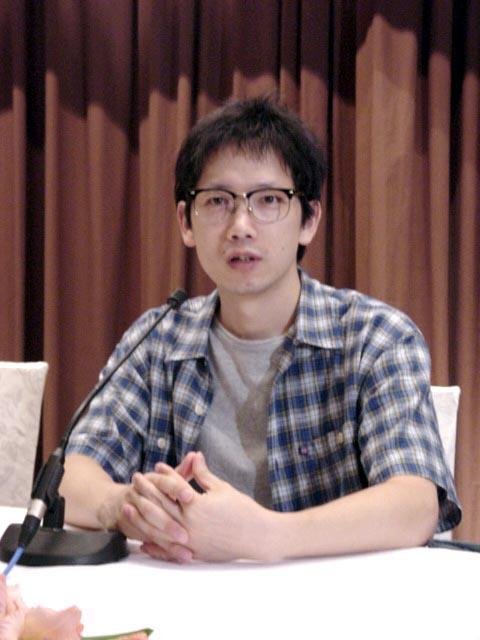 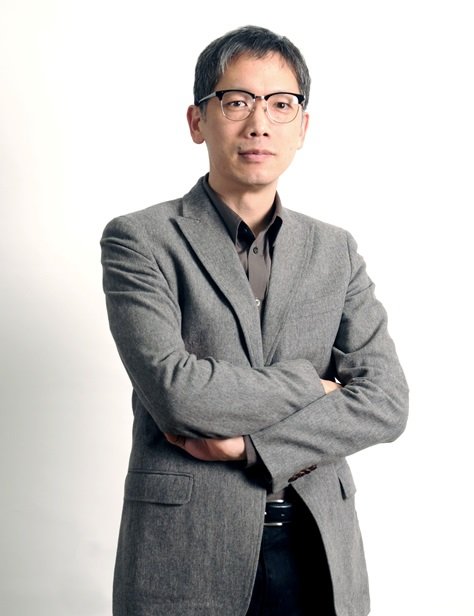 |
|
All things considered, we can interpret the protagonists of Yaguchi's stories, as ordinary people who, after overcoming numerous obstacles and personal weaknesses, discover the truth about themselves. These protagonists do not feel ashamed or insecure about their flaws. Instead, they fully focus on what they can achieve and relentlessly pursue the goal. From social outcasts, they become the heroes and heroines of their own lives. Through his motion pictures, Yaguchi Shinobu does not communicate ideological preaching (how popular in the world of today), but he settles the viewers in a good mood, which is precisely what matters the most. Yaguchi Shinobu is, indeed, the master of feel-good cinema.
Last but not least, Yaguchi stated in his latest interview that he is already working on his next project (source). It is kept secret at the moment, but we can, for sure expect to see the director's personal spin on a unique theme in the upcoming movie.
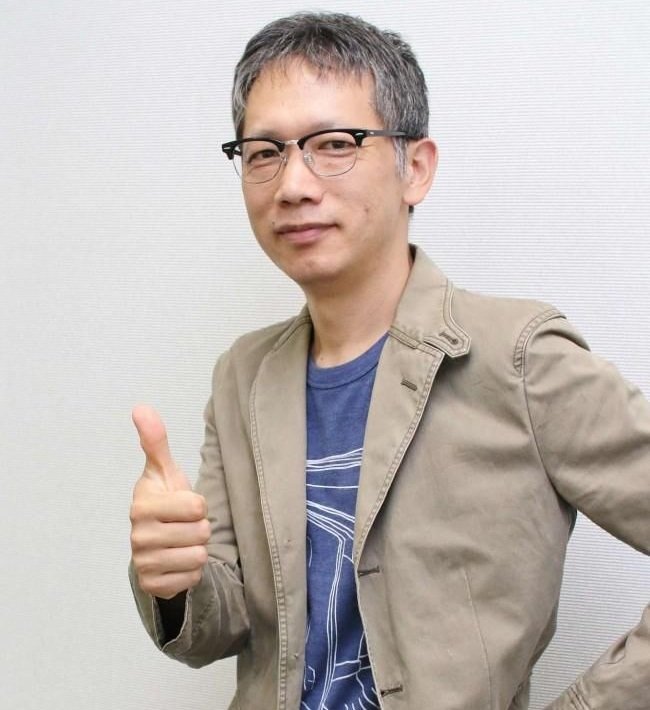
Sources: Japanese Wiki * Harvard Film Archive * Asianwiki * Shinobu Yaguchi can make sparks fly, even off the grid * Interview with Japanese Movie Director: Shinobu Yaguchi * Interview: Shinobu Yaguchi of ‘Survival Family,’ Season 4 Opener at Chicago’s Asian Pop-Up Cinema * INTERVIEW: “Adrenaline” Director Shinobu Yaguchi Lets Loose * In Conversation With Shinobu Yaguchi * Interview with Shinobu Yaguchi: Please Catch the Pig * Toronto Japanese Film Festival World Premiere "Dance With Me" Interview: starring actress Ayaka Miyoshi and director Shinobu Yaguchi
Joe Shiren's Previous Articles: Japanese Actress Ashina Sei Dies at Age 36 (with Old_Anime_Lady) *
Ebisuno92’s Previous Articles: An Ultra Fan's Guide to Takeshi Kitano * An Ultra Fan's Guide to Kyoko Kagawa * Feel the Power of Office Ladies: Shomuni Retrospective * "Watashi, Shippai Shinai No De!”: Daimon Michiko as the Ultimate Doctor-Hero (with ReikaBleu) * "Come on over, Spiritual Phenomena!” TRICK, A Franchise Retrospective * From Best Korea with Love: An Introduction to North Korean Dramas & Movies (with Seonsaeng) * Cursed Cassettes, Countdowns, and Corpses: A SFW Guide to the Ring Series * Blast from the Past: Did Bayside Shakedown Destroy Japanese Cinema? * Weekend Recommendations: Father Knows Best * Godzilla's on the Loose: 65 Years of Kaiju Rampage * An Ultra Fan’s Guide to Yeoh Michelle * Blast from the Past: A Guide to “Girls with Guns” Genre * Weekend Recommendations: Old School Movies * Ebisuno92's Weekend Movie Picks *
So this was our retrospective look at the films of Yaguchi Shinobu.
Have you seen his movies? Please share your thoughts in the comments.
Thank you for reading! Take care of yourselves and stay safe!
Edited by: Yuanwei (1st editor)





